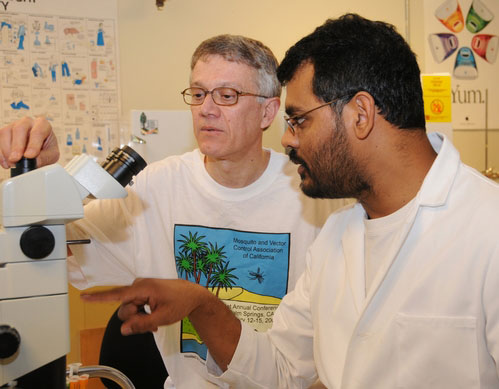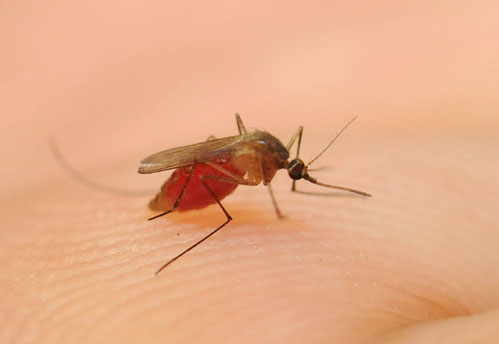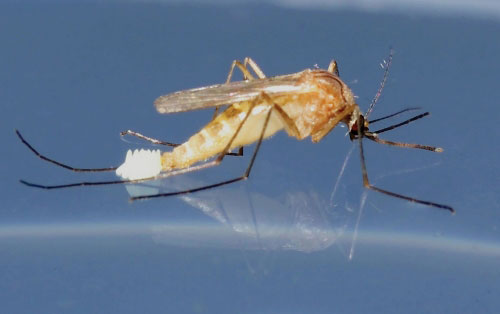Detection of mosquitoes avoiding insecticides
Ecologist Chemist Walter Leal, professor, former president of the UC Davis Department of Entomology, and researcher Zain Syed, Ph.D., jointly discovered the secrets of insect repellent , DEET.
>>> Decoding the genome of the midget Quinquefasciatus
In foundation research published in The Proceedings of the National Academy of Sciences (PNAS) in August 2008, they found that DEET did not hide the smell of the host (animal and human), nor did DEET ruin the Insect senses. Mosquitoes can detect the smell of DEET insect repellent, mosquitoes avoid insecticides because they simply hate this smell.

Walter Leal ( left ), and Zain Syed
Later, on Monday (October 25, 2010), Leal and Syed announced a more groundbreaking study, published in the Proceedings of the National Academy of Sciences (PNAS). They identified the dominant compounds that attract mosquitoes, both in birds and humans.

Gibbons Quinquefasciatus West Nile virus transmission (image by kathy Keatly Garvey)
It is a compound called nonanal, a natural odorant in birds and humans. This not only explains the host change from poultry to humans, but it also paves the way for important development in disease control and mosquito transmission.

Mosquitoes Quinquefasciatus are laying eggs (Photo: Samuel Woo, UC Davis)
Mosquitoes transmit life-threatening diseases, including West Nile virus. Since 1999, the Centers for Disease Control and Prevention has recorded 29,397 cases of illness and 1,147 deaths in the United States.
" Thanks to the Nonanal odor compound, mosquitoes find us, " Leal said. " The mosquito antennas quinquefasciatus are very developed to detect even very low concentrations of nonanal compounds. "
Professor John Carlson works at Yale University, USA, the leading scientist in insect olfactory research, described the study as " interesting with the important meaning of answering questions about how mosquitoes find victims to burn ".
" Leal and Syed have identified the smell of humans detected with great sensitivity by mosquito antennas quinquefasciatus ," Carlson said. " In addition to being interested in its science, studies can apply important practice in controlling mosquitoes and the pathogens they carry. "
Ecology chemist Coby Schal, professor at the University of North Carolina, USA, describes studies as representing " some of the best olfactory studies of insects I've ever read ". . By combining experiments in this field with the sensory response of sensory cells, sensing antennal compounds in the upper jaw of midges, Syed and Leal found that not only the combination of carbon dioxide and nonanal compound is an important indicator for blood-seeking mosquitoes, but also most of the mosquito's sensory cells (antennas) are dedicated to detecting extremely low levels of nonanal compounds.
" Such high sensitivity of neurons that receive odors to detect nonanal compounds can be compared to the reactive properties of neuron pheromone reactions, the nonanal compound itself has played an important role in the evolution of finding the host's favorite host, Schal said. " This is a truly remarkable achievement of two outstanding researchers Syed and Leal, along with the previous great contribution that explains the mystery on a variety of arthropods. "
Leal, a newly elected member of the American Society of Entomology (he is one of 10 honors of entomology in 2010) and Syed, is one of the researchers and a postdoctoral fellow at the University. UC Davis in early 2010.
- Spray mosquito repellent to watch for poisoning
- Mosquitoes raging in Bangkok
- Interesting findings about mosquitoes
- 10 interesting things about mosquitoes
- Find four natural substances that kill insects
- Why do humans not erase mosquitoes?
- Why do mosquitoes love to burn humans?
- Change the sex of the mosquito
- 'Eat - wear - stay' helps you kill mosquitoes thoroughly
- Why are mosquitoes sucking blood from HIV, mosquitoes not sick?
- The experiment destroyed most of the mosquitoes on the Chinese island
- Mosquitoes' mosquitoes to block malaria
 Why do potatoes have eyes?
Why do potatoes have eyes? 'Tragedy' the world's largest carnivorous life: Death becomes ... public toilet
'Tragedy' the world's largest carnivorous life: Death becomes ... public toilet Tomatoes were once considered 'poisonous' for 200 years
Tomatoes were once considered 'poisonous' for 200 years Detecting microscopic parasites on human face
Detecting microscopic parasites on human face